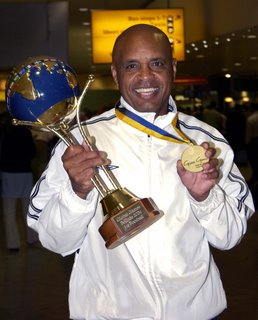No, this isn’t a case of déjà vu – this return trip might just end very differently from our sorry exit earlier this summer.
Back then it was Sven-Goran Eriksson, David Beckham and his multi-million-pound team-mates who are over-hyped, over-priced and (briefly) over-there.
Now, though, it will be 18 non-league players looking to do their country proud as the Learning Disabilities World Cup kicks off at the end of this month.
And England start in the strange role of defending champions, having followed in Ronaldo and Ronaldinho's gilded footsteps in Japan four years ago.
 Their warm-up games have rather more impressive than Sven's minnow-slaying defears of Hungary and Jamaica - a 6-1 win over Germany and a 10-0 trouncing of France.
Their warm-up games have rather more impressive than Sven's minnow-slaying defears of Hungary and Jamaica - a 6-1 win over Germany and a 10-0 trouncing of France.Star players include the appropriately-named striker Tony Boot and wonderkid ‘keeper Harry Hunter, who was just 16 when he won a winners' medal in 2002.
Like the Charlton brothers in 1966, England's 2002 side also boasted a pair of brothers - Frank and Scott Curley.
Frank, a defender, and Scott, a midfield, could be crucial again this summer, alongside captain and former Tottenham Hotspur trainee Ronnie Watson.
LD football follows the same rules as the mainstream game, but only players with an IQ of below 75 can take part.
Many of England's squad started their careers with professional clubs, but have been held back by behavioural problems and the stigma of learning difficulties.
Striker Bertie Brayley played a starring role alongside Joe Cole and Michael Carrick when West Ham won the FA Youth Cup in 1999.
While Cole and Carrick have flourished in the Premiership and for England’s senior side, Brayley has slipped down the divisions and out of professional football.
Manager Lyndon Lynch (above) said: “Who’s to say there aren’t professional players out there who do have learning disabilities? Some of my players have been at top clubs.
“Because of various associated problems, they don’t make it in the professional game.
“Maybe it’s concentration, maybe it’s confidence, maybe it’s behaviour.”
Many Premiership and Football League clubs do run their own LD teams, though – Lynch praises the arrangements at Chelsea, Everton and Crystal Palace, for example.
Players in these sides also tend to turn out for non-league clubs.
Lynch has fostered links with club scouts, coaches, and educational staff, to identify LD players.
He and the FA organise training days and talent weeks across the country, inviting players to turn up for specialist workshops and trials.
He has also set up an under-17s’ squad, which has provided five of the players he will be taking to Germany.
England kick off against South Korea on September 4, then Hungary three days later.
England were crowned the first LD world champions after beating Holland 2-1 in front of 25,000 fans in Yokohama, Japan, four years ago - a few weeks after Brazil beat Germany in the same arena.
They also won the Global Games in Sweden two years later, though Lynch missed the big day of the final due to an eye injury.
Lynch, who took over in 1999 when England were ranked a lowly 12th, said: 'Winning in Yokohama was the best feeling.
'A lot of these players would have faced problems in school and later life, but now they know they can contribute to something special.”
0 comments:
Post a Comment